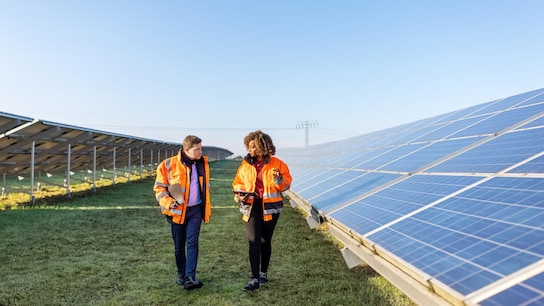Is your organization ready for the journey to net zero and to take climate action?
- Search BSI
- Verify a Certificate
Suggested region and language based on your location
Your current region and language
Embracing opportunities to progress towards a sustainable world, frequently underpinned by Environmental Management System (EMS) Standard - ISO 14001.

ESG and sustainability can include policy and regulation, environmental, social and moral obligations, and financial and operational resilience.
The challenge for organizations is to respond to this complex picture by taking meaningful action to benefit the environmental and social future of our planet and society, rather than risking greenwashing (where false or misleading claims about an organization's sustainability credentials are made).
So how do you approach sustainability effectively?
Explore approaches to managing your sustainability strategy.

Meaningful and lasting sustainability is built through collaboration, knowledge and expertise, forward thinking and pragmatic solutions.
We can help you define and live your purpose, implement governance structures and move from ambition to action.
Wanda Group, a major Chinese multinational property developer, turned to BSI to help put sustainability at the core of their operations.
“Aligning with UN SDGs shows our commitment to sustainability while also helping us achieve our commercial aims.”
Whether it's lowering emissions or adapting to climate change, we can assist your journey towards a sustainable future.
We are committed to providing our clients with impartial and independent certification services. Because of this, we are not able to provide management system or product consultancy services and certification services to the same client where there may be a conflict of interest. This message will appear as a reminder on future visits to our site.
We are committed to providing our clients with impartial and independent certification services. Because of this, we are not able to provide management system or product consultancy services and certification services to the same client where there may be a conflict of interest. This message will appear as a reminder on future visits to our site.
We are committed to providing our clients with impartial and independent certification services. Because of this, we are not able to provide management system or product consultancy services and certification services to the same client where there may be a conflict of interest. This message will appear as a reminder on future visits to our site.
We are committed to providing our clients with impartial and independent certification services. Because of this, we are not able to provide management system or product consultancy services and certification services to the same client where there may be a conflict of interest. This message will appear as a reminder on future visits to our site.

Our unique position, straddling the private sector, governments and NGOs, allows us to share our knowledge across all sectors and regions.
Get in touch
Creating a sustainable organization extends beyond emissions and natural resources; it encompasses people, technology, and a secure digital future.
More about BSIWhether it's lowering emissions or adapting to climate change, we can assist your journey towards a more sustainable future.
